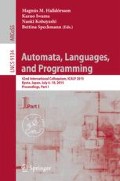Abstract
In this work we focus on a natural class of population protocols whose dynamics are modeled by the discrete version of Lotka-Volterra equations with no linear term. In such protocols, when an agent \(a\) of type (species) \(i\) interacts with an agent \(b\) of type (species) \(j\) with \(a\) as the initiator, then \(b\)’s type becomes \(i\) with probability \(P_{ij}\). In such an interaction, we think of \(a\) as the predator, \(b\) as the prey, and the type of the prey is either converted to that of the predator or stays as is. Such protocols capture the dynamics of some opinion spreading models and generalize the well-known Rock-Paper-Scissors discrete dynamics. We consider the pairwise interactions among agents that are scheduled uniformly at random.
We start by considering the convergence time and show that any Lotka-Volterra-type protocol on an \(n\)-agent population converges to some absorbing state in time polynomial in \(n\), w.h.p., when any pair of agents is allowed to interact. By contrast, when the interaction graph is a star, there exist protocols of the considered type, such as Rock-Paper-Scissors, which require exponential time to converge. We then study threshold effects exhibited by Lotka-Volterra-type protocols with 3 and more species under interactions between any pair of agents. We present a simple 4-type protocol in which the probability difference of reaching the two possible absorbing states is strongly amplified by the ratio of the initial populations of the two other types, which are transient, but “control” convergence. We then prove that the Rock-Paper-Scissors protocol reaches each of its three possible absorbing states with almost equal probability, starting from any configuration satisfying some sub-linear lower bound on the initial size of each species. That is, Rock-Paper-Scissors is a realization of a “coin-flip consensus” in a distributed system. Some of our techniques may be of independent value.
This research was partially funded by the EU IP FET Proactive project MULTIPLEX, by ERC Project ALGAME, by ANR project DISPLEXITY, by NCN grant DEC-2011/02/A/ST6/00201, by University of Liverpool EEE/CS NeST initiative, and by NSERC. A full version of the paper is available at http://arxiv.org/abs/1503.09168.
Access this chapter
Tax calculation will be finalised at checkout
Purchases are for personal use only
Preview
Unable to display preview. Download preview PDF.
References
Abdullah, M.A., Draief, M.: Global majority consensus by local majority polling on graphs of a given degree sequence. Discrete Applied Mathematics 180, 1–10 (2015)
Angluin, D., Aspnes, J., Diamadi, Z., Fischer, M.J., Peralta, R.: Computation in networks of passively mobile finite-state sensors. Distributed Computing 18(4), 235–253 (2006)
Angluin, D., Aspnes, J., Eisenstat, D.: A simple population protocol for fast robust approximate majority. Distributed Computing 21(2), 87–102 (2008)
Angluin, D., Aspnes, J., Eisenstat, D., Ruppert, E.: The computational power of population protocols. Distributed Computing 20(4), 279–304 (2007)
Aspnes, J., Ruppert, E.: An introduction to population protocols. In: Middleware for Network Eccentric and Mobile Applications, pp. 97–120. Springer Verlag (2009)
Becchetti, L., Clementi, A.E.F., Natale, E., Pasquale, F., Silvestri, R., Trevisan, L.: Simple Dynamics for Majority Consensus. In: Proc. SPAA, pp. 247–256 (2014)
Cooper, C., Elsässer, R., Radzik, T.: The power of two choices in distributed voting. In: Esparza, J., Fraigniaud, P., Husfeldt, T., Koutsoupias, E. (eds.) ICALP 2014, Part II. LNCS, vol. 8573, pp. 435–446. Springer, Heidelberg (2014)
Cruise, J., Ganesh, A.: Probabilistic consensus via polling and majority rules. Queueing Systems: Theory and Applications 78(2), 99–120 (2014)
Diamadi, Z., Fischer, M.J.: A simple game for the study of trust in distributed systems. Wuhan University Journal of Natural Sciences 6(1–2), 72–82 (2001)
Dobrinevski, A., Frey, E.: Extinction in neutrally stable stochastic Lotka-Volterra models. Phys. Rev. E 85, 051903 (2012)
Hassin, Y., Peleg, D.: Distributed probabilistic polling and applications to proportionate agreement. Information & Computation 171(2), 248–268 (2001)
Hofbauer, J., Sigmund, K.: Evolutionary Games and Population Dynamics. Cambridge University Press (1998)
Kerr, B., Riley, M.A., Feldman, M.W., Bohannan, B.J.M.: Local dispersal promotes biodiversity in a real-life game of rock-paper-scissors. Nature 418(6894), 171–174 (2002)
Kirkup, B.C., Riley, M.A.: Antibiotic-mediated antagonism leads to a bacterial game of rock-paper-scissors in vivo. Nature 428(6981), 412–414 (2004)
Levin, D.A., Peres, Y., Wilmer, E.L.: Markov chains and mixing times. American Mathematical Society (2006)
Lotka, A.J.: Contribution to the Theory of Periodic Reactions. J. Phys. Chem. 14(3), 271–274 (1910)
Mertzios, G.B., Nikoletseas, S.E., Raptopoulos, C.L., Spirakis, P.G.: Determining majority in networks with local interactions and very small local memory. In: Esparza, J., Fraigniaud, P., Husfeldt, T., Koutsoupias, E. (eds.) ICALP 2014. LNCS, vol. 8572, pp. 871–882. Springer, Heidelberg (2014)
Michail, O., Chatzigiannakis, I., Spirakis, P.G.: New Models for Population Protocols. Morgan & Claypool Synthesis Lectures on Distributed Computing Theory (2011)
Szolnoki, A., Mobilia, M., Jiang, L.-L., Szczesny, B., Rucklidge, A.M., Perc, M.: Cyclic dominance in evolutionary games: a review. J. R. Soc. Interface 11, 20140735 (2014)
Parker, M., Kamenev, A.: Extinction in the Lotka-Volterra model. Phys. Rev. E 80, 021129 (2009)
Reichenbach, T., Mobilia, M.: M, and E. Frey. Coexistence versus extinction in the stochastic cyclic Lotka-Volterra model. Phys. Rev. E 74, 051907 (2006)
Author information
Authors and Affiliations
Corresponding author
Editor information
Editors and Affiliations
Rights and permissions
Copyright information
© 2015 Springer-Verlag Berlin Heidelberg
About this paper
Cite this paper
Czyzowicz, J., Ga̧sieniec, L., Kosowski, A., Kranakis, E., Spirakis, P.G., Uznański, P. (2015). On Convergence and Threshold Properties of Discrete Lotka-Volterra Population Protocols. In: Halldórsson, M., Iwama, K., Kobayashi, N., Speckmann, B. (eds) Automata, Languages, and Programming. ICALP 2015. Lecture Notes in Computer Science(), vol 9134. Springer, Berlin, Heidelberg. https://doi.org/10.1007/978-3-662-47672-7_32
Download citation
DOI: https://doi.org/10.1007/978-3-662-47672-7_32
Published:
Publisher Name: Springer, Berlin, Heidelberg
Print ISBN: 978-3-662-47671-0
Online ISBN: 978-3-662-47672-7
eBook Packages: Computer ScienceComputer Science (R0)

